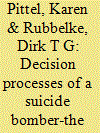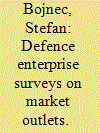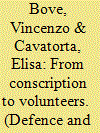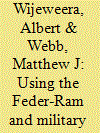| Srl | Item |
| 1 |
ID:
112390


|
|
|
|
|
| Publication |
2012.
|
| Summary/Abstract |
This paper provides a theoretical analysis of suicide attacks and defection. First, decision processes of potential attackers are examined from an economist's perspective. The results are then applied to insights from behavioural economics and psychology. We derive conditions under which agents decide to become suicide bombers-or to announce an attack and defect later. Taking account of hyperbolic discounting we show why the decision to commit a suicide attack can be time-inconsistent and what internal manipulation mechanisms (arising from cognitive dissonance and terror management) and external manipulation mechanisms (employed by terrorist organizations and governments) might prevent or foster time-inconsistency.
|
|
|
|
|
|
|
|
|
|
|
|
|
|
|
|
| 2 |
ID:
112394


|
|
|
|
|
| Publication |
2012.
|
| Summary/Abstract |
This article presents the results of an empirical survey of Slovenian defence enterprises focusing on three segmented geographic market outlets: the domestic market, the other European Union (EU-26) markets and the global markets. In the enterprise surveys are included around two-thirds of the domestic defence enterprises of different sizes and activities. The Slovenian defence enterprises by production, supply-in-return, subcontracting, middleman and trader activities in the defence marketing chains are mostly specializing towards the businesses on the domestic market. Rare enterprises are specialized exclusively for activities on the EU-26 markets and the global markets.
|
|
|
|
|
|
|
|
|
|
|
|
|
|
|
|
| 3 |
ID:
112391


|
|
|
|
|
| Publication |
2012.
|
| Summary/Abstract |
A growing number of NATO countries suspended compulsory military service during the past decade or are now phasing it out, moving to an All Volunteer Force (AVF). An AVF can free resources available for investment in up-to-date equipments, thus improving operational capabilities. Our paper investigates shifts in NATO military expenditure shares on personnel, equipment, infrastructure and other costs over the period 1970-2008 and explores the impact of the transition to AVFs on these shares of the defence budget. Results suggest that while the end of conscription did not reduce the share of spending on personnel, NATO forces are increasingly less reliant on soldiers and more on capital.
|
|
|
|
|
|
|
|
|
|
|
|
|
|
|
|
| 4 |
ID:
112392


|
|
|
|
|
| Publication |
2012.
|
| Summary/Abstract |
This paper examines the relationship between defence spending and income inequality in Turkey for the period of 1963-2007. Using the Theil Index of pay inequality as a proxy of overall income distribution, this study overcomes the problem of lack of time series data. Utilizing basic cointegration and causality tests, the paper aims to add to the literature by providing evidence that defence spending has an impact on income inequality for the case of Turkey.
|
|
|
|
|
|
|
|
|
|
|
|
|
|
|
|
| 5 |
ID:
112389


|
|
|
|
|
| Publication |
2012.
|
| Summary/Abstract |
Do American troops help or hinder economic growth in other countries? We consider a newly constructed dataset of the deployment of U.S. troops over the years 1950-2000 and discover a positive relationship between deployed troops and host country economic growth, which is robust to multiple control variables. Each tenfold increase in U.S. troops is associated with a one-third percentage point increase in average host country annual growth. We explore three possible causal explanations: a Keynesian aggregate demand boost; the diffusion of institutions; and security. Extensive econometric testing, including the use of panel data, confirms the core relationship.
|
|
|
|
|
|
|
|
|
|
|
|
|
|
|
|
| 6 |
ID:
112393


|
|
|
|
|
| Publication |
2012.
|
| Summary/Abstract |
This study uses the Feder-Ram model in conjunction with the military Keynesian model to examine the nexus between defence spending and economic growth in Sri Lanka. We find that the Keynesian aggregate demand model is better suited to analyse the link than the Feder-Ram model for the case of Sri Lanka. Based upon our results we expect a higher economic growth rate in Sri Lanka if more public resources are diverted from the defence to civilian sectors of the economy, now that the war between the government and separatist guerrillas has come to an end. However, recent post war events cast doubt upon whether a diversion of sources from military to non-military spending will actually occur. We conclude that the sanguine predictions of our economic analysis are entirely dependent upon the political decisions of the Sri Lankan government for their realization.
|
|
|
|
|
|
|
|
|
|
|
|
|
|
|
|